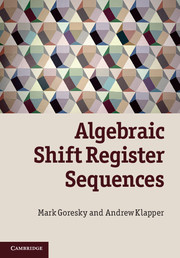Book contents
- Frontmatter
- Contents
- List of figures
- List of tables
- Acknowledgements
- 1 Introduction
- PART I ALGEBRAICALLY DEFINED SEQUENCES
- 2 Sequences
- 3 Linear feedback shift registers and linear recurrences
- 4 Feedback with carry shift registers and multiply with carry sequences
- 5 Algebraic feedback shift registers
- 6 d-FCSRs
- 7 Galois mode, linear registers, and related circuits
- PART II PSEUDO-RANDOM AND PSEUDO-NOISE SEQUENCES
- PART III REGISTER SYNTHESIS AND SECURITY MEASURES
- PART IV ALGEBRAIC BACKGROUND
- Bibliography
- Index
5 - Algebraic feedback shift registers
from PART I - ALGEBRAICALLY DEFINED SEQUENCES
Published online by Cambridge University Press: 05 February 2012
- Frontmatter
- Contents
- List of figures
- List of tables
- Acknowledgements
- 1 Introduction
- PART I ALGEBRAICALLY DEFINED SEQUENCES
- 2 Sequences
- 3 Linear feedback shift registers and linear recurrences
- 4 Feedback with carry shift registers and multiply with carry sequences
- 5 Algebraic feedback shift registers
- 6 d-FCSRs
- 7 Galois mode, linear registers, and related circuits
- PART II PSEUDO-RANDOM AND PSEUDO-NOISE SEQUENCES
- PART III REGISTER SYNTHESIS AND SECURITY MEASURES
- PART IV ALGEBRAIC BACKGROUND
- Bibliography
- Index
Summary
This is the most general, but also the most abstract chapter on sequence generators in the book. In this chapter we describe the theory of algebraic feedback shift registers (AFSRs). This is a “shift register” setting for the generation of pseudo-random sequences, which includes as special cases the theory of linear feedback shift register (LFSR) sequences, feedback with carry shift register (FCSR) sequences, function field sequences, and many others. The general framework presented here first appeared in 1999 [120] (following an intermediate generalization of FCSRs [105]). It “explains” the similarities between these different kinds of sequences. Many of the interesting properties of these sequences simply reflect general properties of any AFSR sequence. However, because this chapter is fairly abstract, the rest of the book has been written so as to be largely independent of this chapter, even at the expense of sometimes having to repeat, in a special case, a theorem or proof which is fully described in this chapter.
Definitions
The ingredients used to define an algebraic shift register are the following.
An integral domain R (see Definition A.2.1).
An element π ∈ R.
A complete set of representatives S ⊂ R for the quotient ring R/(π). (This means that the composition S → R → R/(π) is a one to one correspondence. See Section 5.2.)
Information
- Type
- Chapter
- Information
- Algebraic Shift Register Sequences , pp. 96 - 132Publisher: Cambridge University PressPrint publication year: 2012
Accessibility standard: Unknown
Why this information is here
This section outlines the accessibility features of this content - including support for screen readers, full keyboard navigation and high-contrast display options. This may not be relevant for you.Accessibility Information
- 1
- Cited by
